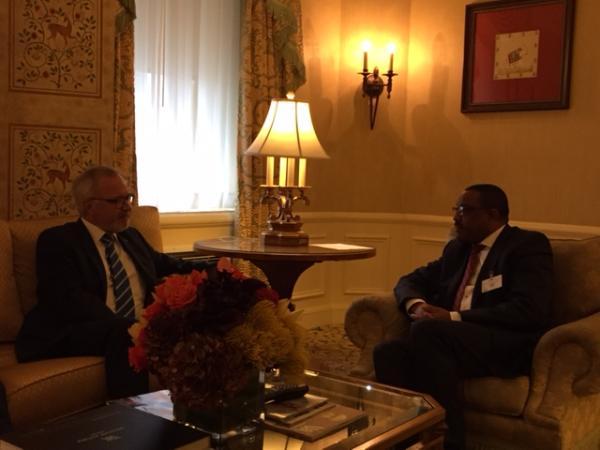
A major investment for Ethiopia, which hosts the largest population of refugees in Africa, has been endorsed by the European Investment Bank, the EU Bank. The project is seen as a flagship project for sub-Saharan Africa.
EIB President Werner Hoyer today announced the EIB has agreed with the Ethiopian Government as well as European and international development partners to work together to prepare financing to support a programme of investment in Ethiopia aimed at helping thousands of refugees into work. It is linked to the granting of employment rights and opportunities for refugees by the Ethiopian government.
The USD 500 million package of investments would build two industrial parks –creating the jobs needed to make the granting of these employment rights a success. Under the initiative, it is envisaged that the EIB could itself provide around USD 200 million of the total USD 500 million needed in loans to the Ethiopian Government alongside USD 50 million of EU grants. The World Bank Group, the British Government and possibly other EU Member States would provide the rest of the financing.
EIB President Werner Hoyer met Ethiopian PM Hailemariam Desalegn at the United Nations Summit for Refugees and Migrants in New York this week to pledge his support following a proposal from the Ethiopian government.
President Hoyer said, “We know that Ethiopia is for many a stopping point before making the dangerous onward journey to final destinations in Europe. Initiatives and projects like this provide people with a choice to stay closer to home and an opportunity for economic growth as well. “
“This is a ground-breaking project – a showcase for Sub-Saharan Africa - and one that perfectly reflects our conviction that creating job opportunities and economic resilience in countries impacted by the migration and refugee challenge is the right way ahead. It’s also an excellent example of how the EU bank is helping Europe act beyond its borders to tackle the refugee and migration challenges which now affect nearly every part of the globe. Giving refugees the chance to work alongside local people makes sense. This project could lead to the employment of about 100,000 Ethiopians and refugees working side by side in good sustainable jobs. This is why the EIB is pleased to announce that we have agreed to work with the Ethiopian Government as well as other EU and international development partners y to support it and why I have assured Prime Minister Desalegn of this. I congratulate him on the leadership he has shown and on his determination to build on this idea. “
President Hoyer has been participating at the United Nations Summit on Refugees and Migrants this week. He’s been laying out how the EIB can work with its development partners to help tackle global challenges better. He described how the EIB’s new Economic Resilience Initiative for the Western Balkans and the EU’s Southern Neighbourhood is being rolled out.
See full speech.
http://www.eib.org/attachments/general/events/20160919_unga_hoyer_speech_en.pdf
More information:
Under the Ethiopia Jobs Compact partnership the European Investment Bank and the European Union, World Bank, and UK-Department for International Development, will work with the Ethiopian Government on expanding industrialization and job creation; aiming to mobilize up to USD 500 million in additional concessional debt financing as well as additional grant support.
This would involve the construction of industrial parks and associated infrastructure as well as funding for training, housing and support to the settling of refugees in new communities and financing for the greening of industrial parks.
The Government of Ethiopia would commit to providing permits for 30,000 refugees (equally split between men and women) to work in the parks, alongside 60,000 Ethiopians as well as helping the transition and relocation of refugee workers industrial park employment.
The first industrial park was just completed in Hawassa and is close to be fully subscribed and when fully operational will employ at least 30,000 garment sector workers. The Government of Ethiopia is working to build on this success with a pipeline of more than 10 additional parks.
There are estimated to be over 730,000 foreign refugees in Ethiopia with the largest groups coming from South Sudan (284,000), Somali (250,000) and Eritrea (155,000). Many of these, in particular young men from Eritrea, use Ethiopia as a stopping point before heading to destinations in Europe. Whilst Ethiopia currently has an open border policy for most refugees they are not allowed formally to work outside of the camp environment.
EIB support for an amount of up to USD 200 million, subject of course to satisfactory due diligence, environmental and social impact studies, and approval of its governing bodies.
Event page:
United Nations Summit for Refugees and Migrants
http://refugeesmigrants.un.org/summit
http://www.eib.org/infocentre/events/all/united-nations-summit-for-refugees-and-migrants.htm

Photographer: EIB ©EIB
Download original